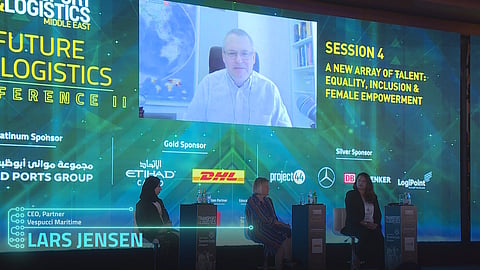Key is to Be Kind and Alter Performance Parameters for New Parents
The next question asked by CEO & Partner of Vespucci Maritime and industry thoughtleader Lars Jensen to the panellists of the Gender Diversity and Inclusion session of Transport and Logistics Middle East’s Future of Logistics Conference Part II was how do organisation accommodate employees on their return from extended parental leave?
Eva Mattheeussen, Head of HR, MEA and Global Project Lead at DHL Global Forwarding said that parental leave was a personal decision and something that should be discussed with one’s partner.
Ms Mattheeussen said it was very important “to be kind when people come back to work.” Personally, Ms Mattheeussen said she been very lucky and her company and colleagues has been very accommodating during her pregnancy and thereafter. The period also helped her grow professionally by delegating work and recognising hidden talents in her team of co-workers.
Ms Mattheeussen concluded by adding that not only the women but managements also need to recognise and accomodate the changes in lifestyle that fatherhood brings about in their male workers.
CEO & Partner of Vespucci Maritime and container shipping expert, Lars Jensen said that companies HR teams need to recognise that people go through different “life phases”. When young people are hired they have a lot of energy and theoretical knowledge but they take their time to actually learn the job.
In the next phase employees start to create their own families which take a lot of their time and attention. Lastly, one arrives at a phase where one has the experience and the time to spend on their work and achieve results.
However, in today’s workplace, especially early in your carrier, one is expected to be eager, inquisitive and learn and have a family and spend a lot of time at work. Talent managers need to recognise that all of these cannot be done at once and work expectations need to be tempered to what phase in life a particular employee is going through.
Priyanka Ann Saini, MD, Marketing and PR, Supply Chain and Logistics at Charlie Pesti said the “measurement metrics have to change” within the culture of the organisation. Talking to women and understanding what it is like to have a baby and all the work that comes after was very important.
Women tend to push themselves harder to achieve their targets during the pregnancy months and prove their performance. However, companies need to change their attitudes and expectations from new parents, concluded Ms Saini.
Watch More: Government Policies Should Encourage Women in the Workplace


